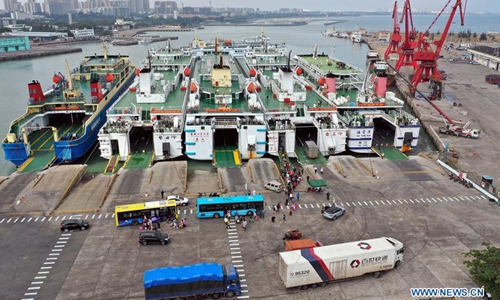Country focuses on carrying out phase one trade deal with US on market basis: experts
China will implement the phase one trade deal based on market and WTO rules, aiming to further advance bilateral economic and trade development and contribute to the world economy, Chinese officials and experts said on Tuesday.
China welcomes high-quality and competitive US products to meet its continuously growing domestic consumption needs, and it hopes the US government will help create the conditions to expand its exports to the Chinese market, Li Xingqian, head of the Department of Foreign Investment Administration at the Ministry of Commerce (MOFCOM), said at a press conference in Beijing.
China will increase its imports of US products based on market demand and WTO rules, Li said, noting that this will not affect Chinese imports from other countries.
“China has started to earnestly carry out the phase one trade deal, since it will not only focus on the targeted purchase quantities but will also consider the market price and the quality of products – to pursue real market behavior,” said Cheng Dawei, a research fellow at the Institute of China’s Economic Reform and Development under Renmin University of China.
China and the US on Thursday signed a phase one economic and trade agreement after nearly two years of negotiations.
According to the terms of the deal, China’s purchases and imports from the US of manufactured goods, agricultural goods, energy products and services will exceed the 2017 baseline amount by no less than $200 billion during the two-year period from January 1, 2020 to December 31, 2021.
China is showing its goodwill, and it is dedicated to putting words into action to buy more US goods as the country, which has a population of more than 1.4 billion with rising incomes, will continue to generate increased demand for high-quality goods, Bai Ming, a deputy director of the Ministry of Commerce’s International Market Research Institute, told the Global Times on Tuesday.
China is one of the world’s largest consumption markets and its growth potential is increasing rapidly thanks to its rising demand for a diversified range of products, experts said.
Cheng told the Global Times on Tuesday that the US-initiated trade war forced the global market into a twisted situation as some other countries reportedly showed concern that China’s increase of US imports would squeeze their own presence in the Chinese market.
In the long run, countries are expected to adjust their competitive competence to facilitate the global market and maintain sound order, she said.
“We sincerely welcome international companies [to China] to compete on an equal footing and develop in the vast Chinese market,” said Li, the official.
There would be some difficulties as the two countries seek to implement the deal, and what needs to be highlighted is that talk is the proper way to address issues instead of resorting to tariffs again because the interim agreement never came easily, Bai said.
To actively expand imports is the Chinese government’s established trade policy and the country’s necessary choice to advance high-quality trade development, Li said, adding that increasing imports will help bring China’s development achievements and reform dividends to benefit the world.
Aerial photo taken on Jan. 19, 2020 shows ro-ro ships at the Xiuying Port in Haikou, capital of south China’s Hainan Province. The Qiongzhou strait witnessed a travel rush peak as the Spring Festival is approaching. Photo:Xinhua


